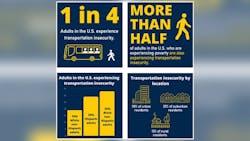Editor’s Notebook: How to measure transit insecurity?
As the transit industry continues its evolution in data collection and analysis, central but hard to measure metrics are being discussed – especially those that could shed light on where transit services are needed most. One of these metrics is transit insecurity.
In February 2023, the Federal Transit Administration (FTA) awarded a $6 million grant to the University of Minnesota to design a program, Mobility, Access and Transportation Insecurity (MATI), that identifies and addresses the contributing factors leading to transportation insecurity. The FTA noted nationally, several well-established policies and programs aim to address food insecurity and housing insecurity, but not transportation insecurity.
In my February column, I shared information regarding a recent Centers for Disease Control and Prevention (CDC) analysis on the number of adults who lack access to reliable transportation and the health outcomes associated with that lack of transportation access.
Just as the CDC found a statistically significant link between health outcomes and transportation access, University of Minnesota researchers are analyzing how the metric can be used to study the link between transit insecurity and access to school, work and social activities. FTA says one in four Americans is unable to access transportation regularly and reliably and cites research indicating “transportation insecurity is a significant factor in persistent poverty.”
The challenge, according to Assistant Professor Alexandra Murphy from the University of Michigan Department of Sociology, is that transit insecurity is difficult to measure, often gets overlooked and a shared definition to discuss the topic is lacking.
Mineta Transportation Institute (MTI) published a report in July 2021, "No Ticket to Ride: A Systematic Definition of Transit Insecurity,” that reviewed a series of articles published between 2005 and 2020 to establish a definition of transit insecurity.
The result was a definition of transit insecurity being “the inability to consistently access or afford a reliable transportation system leading to demonstrable negative impacts on a person or community. Persons and communities experiencing transit insecurity may directly perceive these negative effects, though they also may not.”
This MTI analysis also determined four primary factors that contribute to a person or community being transit insecure: (1) income level, (2) travel distance, (3) travel duration and (4) accessibility.
University of Minnesota researchers have a simplified definition: The experience of being unable to move from place to place in a safe or timely manner. This has assisted researchers in the development of the Transportation Security Index, which is described as “the first validated measure of transportation security that offers insights into who experiences transportation insecurity and enables researchers and practitioners to determine which interventions can improve this condition.”
The MATI program will select up to eight applicants in Phase 1 of its FTA-funded project to receive up to $150,000 to support the development and submission of a plan for a proposed demonstration project to address transportation insecurity. Phase 2 will provide $700,000 to up to four applicants for the full deployment of the proposed demonstration.
Mass Transit will continue to keep an eye on these developments as research progresses.
About the Author

Mischa Wanek-Libman
Group Editorial Director
Mischa Wanek-Libman is director of communications with Transdev North America. She has more than 20 years of experience working in the transportation industry covering construction projects, engineering challenges, transit and rail operations and best practices.
Wanek-Libman has held top editorial positions at freight rail and public transportation business-to-business publications including as editor-in-chief and editorial director of Mass Transit from 2018-2024. She has been recognized for editorial excellence through her individual work, as well as for collaborative content.
She is an active member of the American Public Transportation Association's Marketing and Communications Committee and served 14 years as a Board Observer on the National Railroad Construction and Maintenance Association (NRC) Board of Directors.
She is a graduate of Drake University in Des Moines, Iowa, where she earned a Bachelor of Arts degree in Journalism and Mass Communication.
